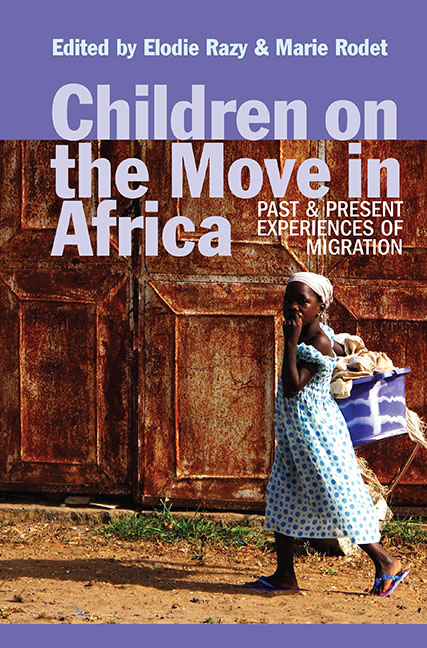Book contents
- Frontmatter
- Contents
- List of Illustrations
- Notes on Contributors
- Preface
- Acknowledgements
- Introduction: Child Migration in Africa: Key Issues & New Perspectives
- Part I CHILD MIGRANTS IN AFRICA: BEYOND THE DILEMMA OF VULNERABILITY v. AGENCY
- Part II BEING A CHILD & BECOMING A GENDERED ADULT: THE CHALLENGES OF MIGRATIONS IN CHILDHOOD
- 3. ‘Bringing a Girl From the Village’: Gender, Child Migration & Domestic Service in Post-colonial Zambia
- 4. ‘I Will Never Become a Crocodile but I am Happy if I Eat Enough’: A Psychological Analysis of Child Fosterage & Resilience in Contemporary Mali
- 5. Working as a ‘Boy’: Labour, Age & Masculinities in Togo, c. 1975–2005
- Part III MOBILITY, IMAGINATION & MAKING NATIONS
- Bibliography
- Index
3. - ‘Bringing a Girl From the Village’: Gender, Child Migration & Domestic Service in Post-colonial Zambia
from Part II - BEING A CHILD & BECOMING A GENDERED ADULT: THE CHALLENGES OF MIGRATIONS IN CHILDHOOD
Published online by Cambridge University Press: 25 October 2017
- Frontmatter
- Contents
- List of Illustrations
- Notes on Contributors
- Preface
- Acknowledgements
- Introduction: Child Migration in Africa: Key Issues & New Perspectives
- Part I CHILD MIGRANTS IN AFRICA: BEYOND THE DILEMMA OF VULNERABILITY v. AGENCY
- Part II BEING A CHILD & BECOMING A GENDERED ADULT: THE CHALLENGES OF MIGRATIONS IN CHILDHOOD
- 3. ‘Bringing a Girl From the Village’: Gender, Child Migration & Domestic Service in Post-colonial Zambia
- 4. ‘I Will Never Become a Crocodile but I am Happy if I Eat Enough’: A Psychological Analysis of Child Fosterage & Resilience in Contemporary Mali
- 5. Working as a ‘Boy’: Labour, Age & Masculinities in Togo, c. 1975–2005
- Part III MOBILITY, IMAGINATION & MAKING NATIONS
- Bibliography
- Index
Summary
Domestic service has been one of the most significant sources of urban employment for men, women and children in post-colonial Zambia. There has been a marked shift in the gender and age demographic of the domestic labour force over the last 50 years. While in the 1960s, most domestic workers were adult men, by the 2010s estimates suggest that over 56 per cent of domestic workers were female, a large number of whom were children. This gendered and generational shift was the result of a combination of factors, including widespread economic decline, increased female labour-force participation and related demands for female labour for child care. Building on historical practices of rural– urban labour migration, many of the women and children who entered into domestic service in post-colonial Lusaka came from rural areas. Like other labour migrants, their migration strategies were influenced by rural poverty, intersecting hierarchies of gender and age, and participation in social networks that spanned rural–urban divides.
Despite a rich historical tradition of research on migration in Zambia, the history of female labour migrants, including domestic workers, remains understudied. The existing literature focuses almost exclusively on male workers and industrial labour, despite the fact that in the colonial and post-colonial periods, Zambians have migrated for a variety of reasons and to enter many different forms of work. Female labour migrants, largely excluded from formal labour regimes, have pursued migration strategies that do not fit into existing narratives.
The literature fails to acknowledge the significance and scale of female labour migration and it does not adequately address how gender and generation have intersected in the development of migration strategies.
If female adult migrants remain understudied, female children are even more obscure figures in the literature on migration. Children have migrated to Lusaka within family units and as unaccompanied migrants since the 1930s. Yet the experiences of child migrants remain under-theorized and under-represented. For the colonial period, child migrants, like women, are mostly described in passive terms, as having been ‘sent for’ or ‘brought to’ Lusaka by husbands, relatives or urban employers. There are few studies of children's migration in the post-colonial period. The literature that does exist is dominated by the publications of international development organizations and is clearly influenced by Western perceptions of childhood as a period of dependency and vulnerability.
- Type
- Chapter
- Information
- Children on the Move in AfricaPast and Present Experiences of Migration, pp. 69 - 84Publisher: Boydell & BrewerPrint publication year: 2016



